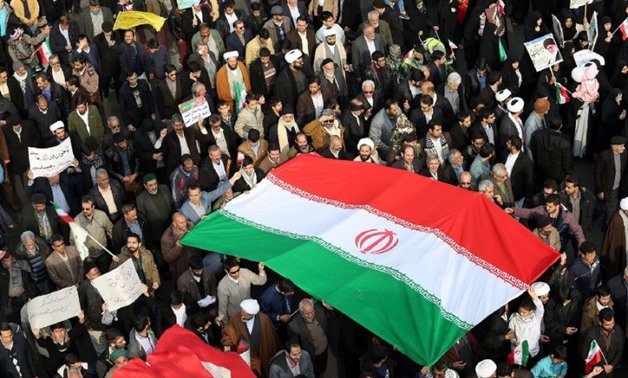
Iranians rally in support of the government in the city of Mashhad on January 4, 2018, after authorities declared an end to days of deadly unrest sparked by economic concerns - AFP
IRAN - 4 January 2018: Iran saw another day of large pro-regime rallies on Thursday after authorities declared the end of deadly unrest and turned attention to addressing the economic concerns that fuelled protests.
A week after demonstrations broke out, there was a very heavy police presence on the streets of Tehran, AFP journalists said, and no reports of fresh protests overnight.
Limited activity on social media suggested unrest in provincial towns was also down.
The US said it may look to impose fresh sanctions on Tehran over its "crackdown", but Russia warned Washington against interfering in Iran's internal affairs.
Iranian state TV showed huge crowds marching in support of the government across 10 cities early Thursday, including Isfahan, Ardebil and Mashhad, where the protests first erupted a week ago.
"We are together behind the leader," chanted the crowds, in reference to supreme leader Ayatollah Ali Khamenei.
In a bid to address grievances that drove the initial unrest, Iranian authorities were weighing options including blocking unpopular measures in President Hassan Rouhani's recent budget.
"The people's main demand now is for the government and officials to deal with the economic problems," Ali Akbar Velayati, an advisor to Khamenei, told the semi-official ISNA news agency.
The head of the army, General Abdolrahim Mousavin, thanked security forces for "putting out the fire of sedition".
A total of 21 people died and hundreds were arrested in five days of unrest that began on December 28 as protests over economic woes and quickly turned against the regime as a whole, with attacks on government buildings and police stations.
Interior Minister Abdolreza Rahmani Fazli on Thursday said 42,000 people had taken part in the unrest nationwide.
It was a higher figure than the 15,000 given by the head of the Revolutionary Guards a day earlier, but still far below the hundreds of thousands that took to the streets during the last major protest movement in 2009.
The unrest caused international concern, with the United States in particular accusing authorities of a crackdown on dissent.
A White House official, who asked for anonymity, on Wednesday said Washington would look for "actionable information" to try to impose fresh sanctions on those responsible.
US President Donald Trump has repeatedly tweeted his backing for Iranian protesters saying he has "such respect for the people of Iran as they try to take back their corrupt government."
Iranian Foreign Minister Mohammad Javad Zarif tweeted back on Thursday: "Trump has an odd way of showing 'such respect'"
"From labelling them a 'terrorist nation' and banning them from visiting the US, to petty insults on the name of the Persian Gulf," he wrote, referring to Trump's use of the term "Arabian Gulf".
Russia jumped to Iran's defence, with deputy foreign minister Sergei Ryabkov telling state agency TASS: "Despite the many attempts to distort what is really going on (in Iran), I am sure that our neighbour, our friend, will overcome its current difficulties."
The question now is whether Trump will continue to waive nuclear-related sanctions that were suspended under the 2015 nuclear deal between Iran and world powers.
Under the deal, Trump must actively lift certain sanctions every few months and the next deadline falls on January 12.
Iran -- which has long accused the United States and Sunni Arab rivals led by Saudi Arabia of interference in its affairs -- said external "enemies" were behind recent unrest.
Online messaging and photo sharing platforms Telegram and Instagram remained blocked on mobile phones, having been interrupted soon after protests began.
Telecoms Minister Mohammad-Javad Azari Jahromi said Telegram would only be unblocked if it removed "terrorist" content.
Iran's political establishment has closed ranks against the unrest, with even reformists condemning the violence.
But many have also called on Rouhani to address the economic issues that drove the initial protests.
There have already been moves in parliament to block the unpopular budget measures announced last month, which included cuts to welfare and fuel price hikes.
"As concerns petrol prices, we must absolutely take into account the situation of the people because the tensions are absolutely not in the interests of the country," parliament speaker Ali Larijani said on Wednesday.
Rouhani came to power in 2013 promising to mend the economy and ease social tensions, but high living costs and unemployment have left many feeling that progress is too slow.
Rural areas, which have seen years of drought and under-investment, are particularly hard-hit.
In the capital, there is widespread sympathy with the economic discontent fuelling the unrest, particularly an unemployment rate that is officially close to 30 percent for young people.
But some Tehranis said US claims that they were desperate for freedom were overblown.
"We do have some freedom in Iran," Hamid Rahimi, a 33-year-old bank employee told AFP.
"If the people of Iran have something to say, it's about economic problems. They want to see their demands, what they voted for, fulfilled."


Comments
Leave a Comment